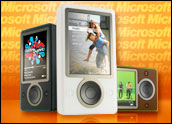
As the tech media and blogosphere focused their spotlights on the announcements coming out of Apple’s “let’s rock,” press event on Tuesday, Microsoft risked being lost in the chatter. The company chose Monday to reveal details about upcoming changes to its Zune digital media player.
Among the new features for the Zune are improved WiFi, radio tagging functionality, a 120 GB model and a 16 GB flash memory version.
“It seems like some minor hardware upgrades,” said Joshua Martin, an analyst at the Yankee Group, “but it’s really about an experience change. They’re offering more functionality and increased usability, and that’s really [how] Microsoft has tried to position the product … the whole time. Easy discovery of music, easy sharing of music, easy interaction with people who like music — that’s been their niche, and it seems they are beginning to hone that message.”
Cat Out of the Bag
The Zune announcement was originally scheduled to hit next week, but retailer Fry’s Electronics miscued, exposing details of the updated Zune to the Web. At that point, it was just a matter of time before the news spread. After Zunerama bloggers published the information, Microsoft decided to seize the moment and roll out the announcement on Monday.
“The intention was not to release the information today,” Martin told TechNewsWorld. “Fry put the product page up, and someone found it, and it had all the details on it, and one thing led to another. So, you can confirm it or deny — they decided why not run with it? People are talking … why not make a splash while you can?”
Zuning In
Among the most noteworthy new Zune features is its new FM tagging capability. Dubbed “Buy from FM,” the feature capitalizes on the Zune’s built-in FM tuner, allowing users to tag and purchase songs they hear while listening to the radio through the device.
They can buy the songs directly from the Zune store. When they are connected to the Internet via a WiFi hotspot or a home computer, the song will download immediately. If, however, no Internet access is available, the Zune will queue tracks for download when a Web connection is established.
Some 450 stations, including those belonging to Clear Channel, have reportedly signed up and will support technology that uses Radio Data System and RT+ data feeds within the FM broadcast frequencies to identify song and artist information.
“It’s a good idea, but Apple had a deal with HD radio guys for iTunes tagging also. It’s an important feature. It’s good because it takes a traditional medium like FM radio into the digital age — but it’s not unique,” Martin said.
The WiFi Factor
Speaking of WiFi, the hardware maker has also given its WiFi a boost enabling users to access the Zune Marketplace music store directly from the device when they are within range of a recognized WiFi hotspot, or through a home wireless network.
The WiFi offering might have been a differentiator for the Zune as it struggled to compete with the iPod, noted Martin, “but the implementation through the first phase was not very good. [It had] a limited area to share content, which was understandable because they were trying to make it a social thing. But it [was hurt by] a combination of factors — small installed base of users and undefined, unclear rules on who content could be shared with.”
All that conspired to make the feature underwhelming, and now Microsoft is “behind the eight ball,” according to Martin, because Apple has included WiFi in the iPod touch.
“WiFi is not terribly useful unless there are actual implementations for being able to find and access additional music, which is really the purpose of the device,” he pointed out.
Firmware and Software
Included in the Zune’s new features are some firmware and software updates.
“Channels” enables users to cruise channels from music industry experts such as the Billboard Top 100, FADER magazine and KEXP radio to discover new music. Users can also create their own custom channels based on their favorite artists and genres.
The smarter Zune will even be able to learn what kind of music a user enjoys and then make personal recommendations using the “Personal Picks” feature. After a user logs onto the Zune Marketplace, they will find a new “Picks” area where their recommendations will be stored.
With the Zune’s new “MixView” software, users select an artist, album or Zune card, which triggers a visual mosaic of related music and listeners. Clicking on the view will highlight a different artist or album.
The firmware update will also improve the Zune’s “Games on the go,” “Audiobooks,” “Audible” and “Overdrive” functionality.
The updated line will be available Sept. 16 in two new colors: blue and silver. The 120 GB Zune is priced at US$249; the 80 GB model at $229. The Flash memory 16 GB version retails for $199, while the 8 GB and 4 GB Zunes will sell for $149 and $129, respectively.




















































